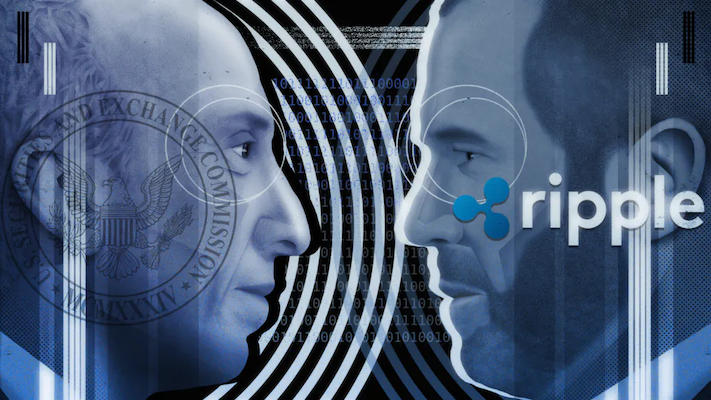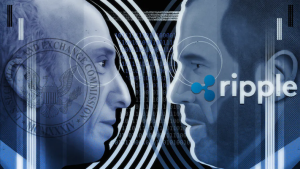Join Our Telegram channel to stay up to date on breaking news coverage
Brad Garlinghouse, CEO of Ripple, has criticized Gary Gensler, Chairman of the Securities and Exchange Commission (SEC), for asserting that he has the right to determine which cryptocurrency tokens are securities rather than relying on the laws that regulate his agency’s authority. The Ripple CEO emphasized that “elected officials in the United States ought to pay note.”
CEO of Ripple criticizes SEC Chair Gensler over definition of a security
Brad Garlinghouse, the CEO of Ripple Labs, has attacked the U.S. Gary Gensler of the Securities and Exchange Commission (SEC) for deciding which cryptocurrency tokens are securities. On last Thursday, Garlinghouse tweeted:
It is incomprehensible that the SEC Chair would claim that he, and not the laws from which his agency draws its authority, determines what constitutes a security. It’s time for American elected officials to pay attention.
“Why would you ever want to provide clarity about what’s ‘in or out’ when you act like an authoritarian overseeing a $2.2B bloated agency? Ambiguity can pass for power when there is no clear jurisdiction” Garlinghouse said.
The SEC chief was quoted as saying: “If Congress were to act, though I don’t think we need these authorities, not to undermine accidentally through definitions of what’s in or out, or in essence allowing for conflicts that we don’t allow.” Gensler claimed that the current securities laws “cover most of the activity that’s happening in the crypto markets.” If implemented, several of the legislative proposals, in my opinion, will weaken the securities remit.
The company has been involved in a legal battle with the securities regulator since the SEC sued Ripple, Garlinghouse, and co-founder Chris Larsen in December 2020. Although Ripple and Garlinghouse have continually denied it, the SEC asserted that XRP is a security.
Gensler has underlined the significance of bitcoin exchanges and lending platforms attending to discuss how to comply with the SEC on numerous times. But, Garlinghouse has charged that the securities regulator met with cryptocurrency firms largely to generate leads for its Enforcement Division. Many complaints have also been made about the SEC’s failure to establish clear regulatory rules, which makes it challenging for businesses operating in the cryptocurrency sector to assure compliance.
The SEC has sent a Wells notice to the Nasdaq-listed cryptocurrency exchange Coinbase for possible securities law breaches. While Gensler has frequently stated that all crypto tokens, except from bitcoin, are considered securities, the company underlined in its statement that “The SEC would not let crypto companies “come in and register” – we tried.”
For the Chair of the SEC to assert that he dictates what is a security – and not the legislation from which his agency derives its power – is beyond comprehension. It's time for elected officials in the US to take notice. https://t.co/kvat6ixUdS
— Brad Garlinghouse (@bgarlinghouse) March 30, 2023
XRP holders’ attorney has a viewpoint , Satoshi Nakamoto’s Bitcoin (BTC) might have served as security as well.
If this had taken place when Satoshi Nakamoto was alive, John Deaton is certain that even Bitcoin might have been accepted as a kind of security.
According to John Deaton, if Satoshi Nakamoto had made a $100,000 offer to sell 100,000 BTC when he was the only or one of the only Bitcoin miners, it would have been regarded as an offer of unregistered securities. This viewpoint accompanied the most recent criticism of U.S. regulators about the cryptocurrency sector and current laws in this area from a pro-crypto lawyer and the legal counsel for XRP holders.
The attorney’s rant began by claiming that the Howey test, which is used to identify a security, is equally misapplied, as well as the term “investment contract,” which is used by authorities like the SEC to define some cryptocurrencies. The lawyer also made the observation that it is interesting that both of these legal topics trace back to before the middle of the 20th century.
According to him, it makes no difference how a cryptocurrency was distributed, such as Ethereum (ETH) through an initial coin offering or XRP sold by Ripple. The asset itself—in this case, the digital code—does not qualify as an unregistered security simply because of the distribution method, according to Deaton.
Deaton concludes, using Bitcoin as an example, that it would appear that every cryptocurrency is a security at the time of its distribution if we adopt the regulators’ line of reasoning.
Related
- Ripple and Montenegro Join Hands Together to Launch Nation’s First CBDC
- Coinbase Considers Relisting XRP if Ripple Wins SEC Lawsuit
- SEC Cracks Down On Crypto Staking – Is The Future Of Staking Under Threat?
Join Our Telegram channel to stay up to date on breaking news coverage


